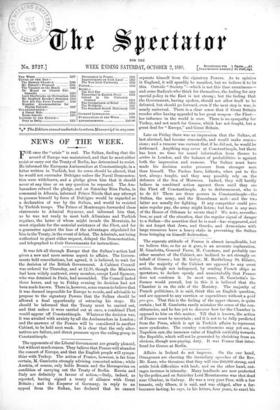The separate attitude of France is almost inexplicable, but we
believe this, so far as it goes, is an accurate explanation. M. Gambetta, General Farre, M. Constans, and probably one other member of the Cabinet, are inclined to act strongly on behalf of Greece ; but M. Grevy, M. Barthelemy St. Hilaire, and the majority of the Cabinet are opposed to any overt action, though not indisposed, by sending French ships as spectators, to declare openly and unmistakably that France does not condemn it. In most cases, M. Gambetta's in- fluence would prevail, but in this it is believed that the Chamber is on the side of the Ministry. The majority of French politicians, it is said, think this an English question, and are opposed to any exertion or expenditure without a quid pro quo. That this is the feeling of the upper classes, is quite certain ; but M. Gambetta rarely mistakes the sense of the con- stituencies, and he has yet to discover how far the Chamber is opposed to him on this matter. Till that is known, the action of France must be uncertain ; and it is not to be fully predicted from the Press, which is apt in Turkish affairs to represent mere syndicates. The country constituencies may yet see, as Napoleon saw, the immense value of English cordiality towards the Republic, which will not be generated by shrinking from an obvious, though non-paying, duty. It was France that inter- fered for Greece at Berlin.


































